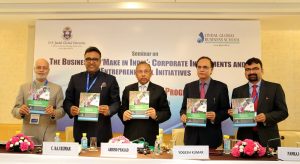New Delhi, November 18, 2018: O.P. Jindal Global University today announced the onset of three day-long Northern Conclave for Building CSR Partnerships in association with Tata Institute of Social Sciences. The sustainability conclave organised collaboratively by O. P. Jindal University CECRAS (Centre for Excellence in Corporate Responsibility and Sustainability) and TISS AESDII (Assessment and Empanelment Standards for Development Institutions in India) is designed to be a platform for action and discussion forum which apart from providing ways of thinking and doing also attempts to link corporations, non-profit organisations (NPOs), government entities and academia.
The three-day Conclave for Building CSR Partnerships aspires to catalyse partnerships amidst multiple stakeholders for achieving sustainable and inclusive development. The Conclave is an opportunity for building and sharing skills useful for CSR practitioners, development workers and other stakeholders concerned with optimizing social impact.
Speaking at the conclave, Professor Amit Lahiri, Chief Sustainability Officer, Associate Director, IIHEd and Executive Director, CECRAS, O.P. Jindal Global University, “It is an immense pleasure to partner with Tata Institute of Social Sciences to host the Northern Conclave for Building CSR Partnerships. The most unique aspect of the three -day conclave is that 2 universities- an 80+ years old public university and 10 years old private university across two cities of Mumbai and Delhi have got together to create a platform for multi-stakeholder dialog. This platform brings together the corporation, the NGOs, the government convened by two leading higher education institutions in India. This is a signal of the pivotal role that higher education can play in India’s development- i.e. a neutral platform for multisectoral partnerships, capacity building, skills training, research and policy advocacy. CSR is all about creating public good and that can only be done through partnerships, because it is not the corporation or the development institution alone that can do it”.
This 3-day platform brought in its opening context setting session two of the most senior bureaucrats-one past and one present- Dr. Bhaskar Chatterjee, ex-Director General of DPE (Department of Public Enterprises) and Mr. Gyaneshwar Singh, Joint Secretary of the MCA, who gave the audience of experienced development professionals an excellent perspective of the past, present and future of CSR-funded development in India.
Dr. Bhaskar Chatterjee, Secretary General, Indian Steel Association shared his insights on the past, present and future of the CSR in India, while highlighting the milestones and challenges faced by the committee when drafting the bill. He revised the important parameters of the Company Act 2013 – CSR goes from backroom to boardroom, ensure that money is spent on a project, Schedule 7 which describes that money spent on any of the listed activities will only be considered as CSR expenditure, implementation should be done through NGO, and comply or explain.
The other important aspect of the opening session was a special plenary lecture by the noted business and human rights scholar Dr. David Bilchitz, Secretary – General, International Association of Constitutional Law and Director, SAIFAC and Professor at Constitutional Law And Fundamental Rights, The University Of Johannesburg in South Africa, who presented arguments on why a binding obligations need to be enacted in the form of an international human rights treaty, making it necessary for some of the largest MNCs (which often have more annual sales revenue than a many developing countries’ GDP taken together) to not only disclose their compliance but also be subject to legal enforcement.
Talking on the forum and highlighting the importance Human Rights, Dr. David Bilchitz, said, “It is an honour to be a part of a platform that offers an important opportunity for NGOs, government, academia to come together and discuss inspirational ideas on sustainability. While CSR is a responsibility that we owe to each other, it is also vital to realise and build a treaty between businesses and human rights. With the rise of globalisation, these treaties are important to address the challenges of international law and ensure adequate protection of human rights.”
The conclave was held on three mandates-day one was, amplification based workshop on skills, participation and developing partnership. Day two saw a transition from theory to practice. Day three culminated with best practises that would pave way to play a much larger larger leadership role in this paradigm changing business and human rights treat negotiations being currently negotiated in Geneva at the UN now.

